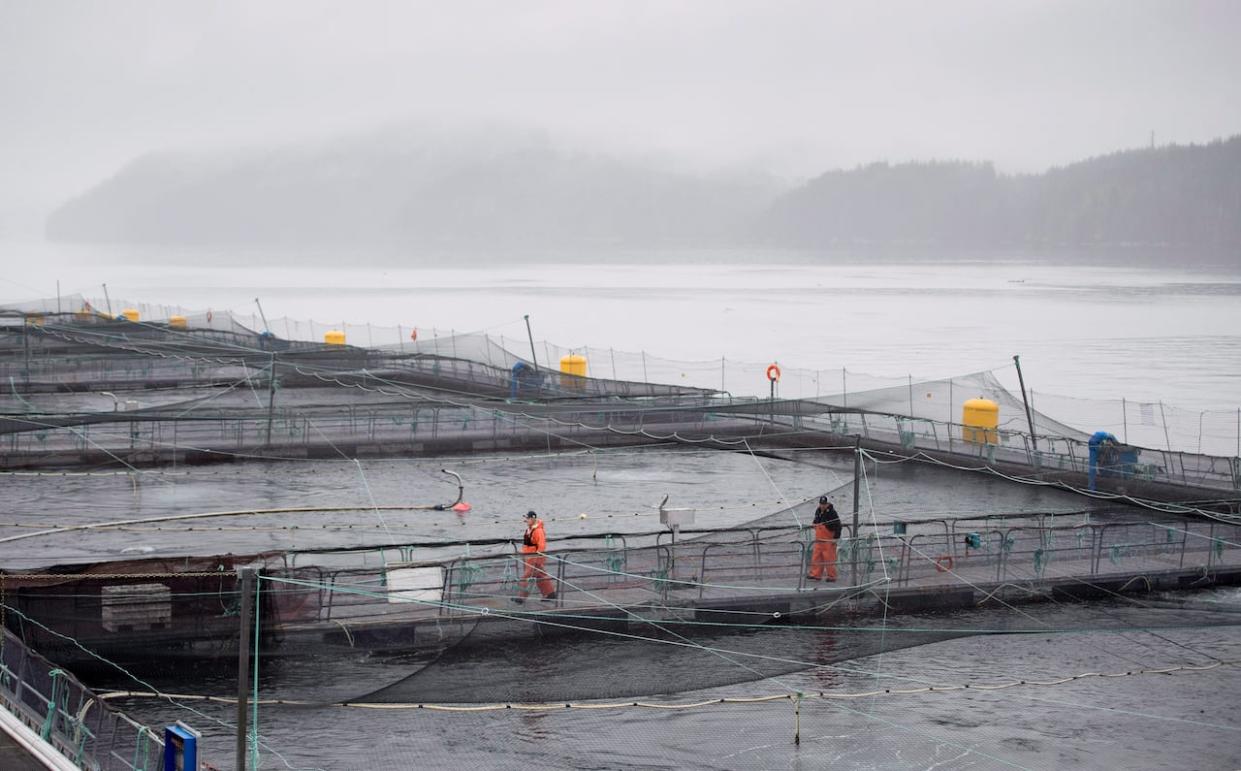Feds delay closure of B.C.'s open-net salmon farms until 2029

The federal government announced Wednesday that it would delay the closure of open net salmon farms off British Columbia's coast until 2029 to facilitate a transition to closed containment systems.
The announcement was met with praise and scorn from stakeholders in B.C.'s salmon industry.
The government had promised to phase out the farms by next year, but Fisheries Minister Diane Lebouthillier instead outlined a transition to closed-containment salmon farm operations she said would allow aquaculture farms to renew their licences in a "responsible, realistic and achievable" way.
It was met with skepticism from the industry.
"The objective is unreasonable because there is no scientific basis to this decision," said Canadian Aquaculture Industry Alliance president and CEO Tim Kennedy in a statement.
"The objective is irresponsible because it threatens 5,000 highly paid and skilled jobs in coastal British Columbia (500 of these jobs held by Indigenous people) during a time of economic stagnation."
The alliance says over 95 per cent of Canada's salmon production comes from salmon farms in ocean pens in British Columbia.
The B.C. Salmon Farmers Association has said an analysis showed the province could lose up to $1.2 billion in economic activity annually if the licences are not renewed.
Open-net fish farms off B.C.'s coast have long been the subject of debate, with environmental groups and some Indigenous nations saying they are linked to the transfer of disease to wild salmon.
A marine conservation specialist with the David Suzuki Foundation praised the federal government's commitment to ending open-net systems and said they were pleased to see a concrete deadline set.
However, Kilian Stehfest argued in a written statement that the five-year timeline failed to meet the "urgency of the moment given the dire state of many wild salmon runs."
"We look forward to a strong transition plan that enshrines an end to open-net pens in law or regulation and supports workers and communities," the statement said.
A group that services B.C.'s salmon farming industry says Ottawa needs to revisit its decision and work toward improving the current net pen sector while developing new technologies.
"The success of introducing innovative technologies in British Columbia relies on this investment and supply ecosystem being strong, stable and predictable," said Ryan Brush, general manager of Aquatrans Distributors.
"The absence of certainty and clarity has already weakened capital investment," he said.
B.C.'s minister of water, land and resource stewardship says it's up to Ottawa to help fund the transition away from open-net salmon farming.
"The federal government needs to work directly with impacted communities and workers on next steps, and they must make sure First Nations have a direct role in determining what the transition looks like in their territories," said Nathan Cullen.
Indigenous leaders from British Columbia have called on the federal government to stand by plans to transition away from open-net salmon farms in an effort to help threatened wild salmon stocks.
The plan to remove open net-pen salmon farms from B.C. coastal waters is supported by most First Nations in the province, said Bob Chamberlin, who represents more than 100 B.C. nations in the First Nations Wild Salmon Alliance.
"It benefits all British Columbians and so this is a very important day for wild salmon, but I think it's a big day for reconciliation across the province," he said at a news conference.
Meanwhile, the Watershed Watch Salmon Society says that while it's pleased with Wednesday's announcement, the planned five-year phase-out period is too long.
"That's five more years of bombarding wild salmon with parasites and viruses from factory fish farms," said Aaron Hill, the society's executive director.
Lebouthillier has been consulting with several groups about the transition plan involving 79 salmon farms after Prime Minister Justin Trudeau pledged during the 2019 election that his government would phase out ocean-pen farming.


